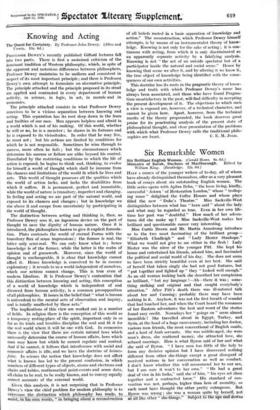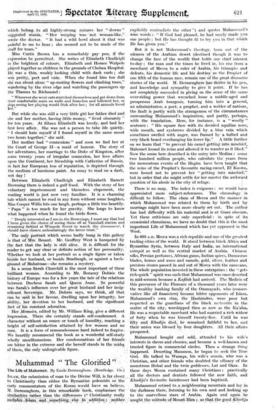Six Remarkable Women
Six Brilliant English Women. (Gerald Howe. 8s. 6d.)
Memoirs of Sarah, Duchess of Marlborough. Edited by William King. (Routledge. 12s. ad.)
HALF A DOZEN of the younger writers of to-day, all of whom have already distinguished themselves, offer us a yery pleasant book of essays about six outstanding English women. The little series opens with Aphra Behn, " the loose living, kindly, successful Astrea ' of Restoration London," whose " trollop- ing muse " delighted the Coffee Houses and whose plays filled the new " Duke's Theatre." Miss Sackville-West distinguishes between what has " been said " about the lady, and what may be regarded as true. Even in her own life- time her past was " doubtful." How much of her adven- tures did she make up ? Miss Sack-ville-West makes her brilliant and questionable career very interesting.
Miss Curtis Brown and Mr. Martin Armstrong introduce us to the two most fascinating of the brilliant group- " Elizabeth Chudleigh " and " Lady Hester Stanhope." What we would not give to see either in the flesh I Lady Hester was the niece of the younger Pitt. She kept his house and entertained his friends, adored him, and fascinated the political and social world of his. day. She does not seem to have been strictly beautiful even at her best. She said of herself that taken singly she had not good features, but " put together and lighted up " they " looked well enough." As an old woman looking back she described her complexion as brilliant, " but my language !—Ah—there it was ; some- thing striking and original and that caught everybody's attention." After Pitt's death there was ill-natured talk about her and Canning; probably there may have been nothing in it. Anyhow; it was not the first breath of scandal that had touched her, and when the Court heard the romances of her Eastern adventures the best and worst of the stories found easy credit. Nowadays her " goings on " seem almost incredible I She travelled about in Egypt, Turkey, and Syria, at the head of a huge caravansary, including her doctor, various men friends, the most conventional of English maids, and a host of Arab servants. She was middle-aged, she wore man's dress, she scattered money, she attracted love, she refused marriage. Here is what Byron said of her and what she said of Byron. " I have seen too little of the lady to form any decisive opinion but I have discovered nothing different from other she-things except a great disregard of received notions in her conversation as well as conduct. I don't know whether this will recommend her to our sex, but I am sure it won't to her own." " He had a great deal of vice in, his looks," said she of him, " his eyes set close together and a contracted brow." His standard of con- vention was not, perhaps, higher than hers of morality, so each must have thought the other pretty outrageous. But Byron was wrongi she was a woman quite by herself, not at all like other 4 firthe ups and doiins which belong . to all highly-strung natures her " downs " suggested - mania. ".Her weeping was "-not- - wrote the doctor. " It had a wild howl about it that was painful to me to hear ; she seemed not to be made of the stuff for tears."
Miss Curtis Brown has a remarkably gay pen; if the erceression be permitted. She writes of Eliiabeth Chudleigli in the brightest of colours. Elizabeth and Horace Walpole
played together as children in the grounds of Chelsea Hospital. He was a thin, -weakly looking child with • dark curls ; she was pretty, pert and vain. When she found him too dull she ran about alone " up-rooting flowers and climbing trees," wandering by the river edge and watching the passengers up
the' Thames to Richmond : - •
" Wherever she went cats stretched themselves and got down from their comfortable seats on walls and branches and followed her, or dogs seeing her playing would frisk after her ; for all animals loved her."
But while she was still a very little girl her father died and she and her mother, baying little money, " lived obscurely "
for ten years. At fifteen Elizabeth was lovely, and bad her first love affair. She was not a person to take life quietly. " I should hate myself if found myself in the same mood two hours together," she said.
Her mother had " connexions " and soon we find her at the Court of George II—a maid of honour. The story of her adventures, her marriage to the Duke of Kingston, after some twenty years of irregular connexion, her love affairs upon the Continent; her friendship with Catherine of Russia,
in fact her European loss of reputation, is depicted through the mediuth of luminous paint. An essay to read on a dark, wet day I
Between Elizabeth Chuclleigh and Elizabeth Barrett Browning there is indeed a gulf fixed. With the story of her voluntary imprisonment and blameless elopement, the reading world is just now very familiar. It is a charming tale which cannot be read in any form without some laughter. Miss Cooper Willis lets one laugh, perhaps a little too heartily. " Papa " is too much for her gravity. She longs to know what happened when he found the birds flown.
" Deeply interested as I am in the 13rownings, Imust say that had Il;s3en given the choice Of seeing them off at Vauxhall station and rilmaining ;behind at Wimpole Street to watch the denouemmt, I Should have choSen Unhesitatingly the latter -treat."
• The only portrait which seems badly hung in this gallery
is that of Betant. Mr. Geoffrey West is hampered by the fact that the lady- is- still alive. It is difficult for the reader to get any clear or definite notion of her personality.
Whether we look at her portrait as a single figure or taken beside her husband, or beside Bradlaugh, or against a back-
ground.of Mahatmas—she remains a mystery.
In a sense Sarah Churchill is the most important of these
hrilliant women. According to Mr. Bonny trobiee the history of Europe was for a few years the tale of the relations between Duchess Sarah and queen ,Anne. So powerful was Sarah's influence over her great -husband and her insig- nificant Sovereign. Mr. Dobree says, we . think, all that can be said in her favour, dwelling upon her integrity, her ability, her 'devotion to her husband, and the- significant
fact of his constant adoration.
Her Memoirs, edited by Mr. William King, give a different
impression. There she certainly stands self-condemned. A character without an ounce or touch of humility, reaching a height of self-satisfaction attained by few women and no men. It is a form of remorselessness hard indeed to forgive.
We heartily recommend the book as a wonderful self-study wholly unselfconscious. Her condemnations of her friends are bitter in the extreme and she herself stands in the midst of them, the only unforgivable figure.



























































 Previous page
Previous page